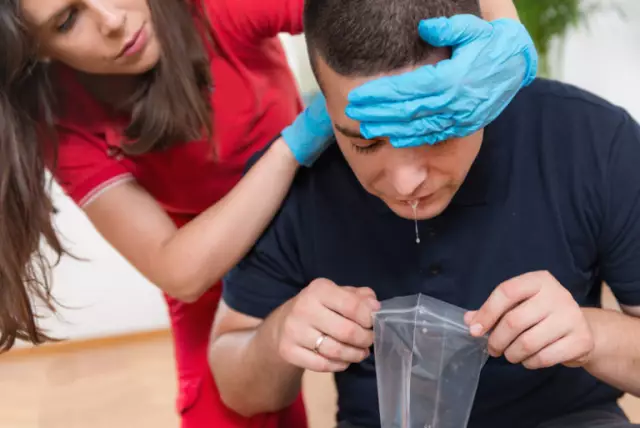- Author Rachel Wainwright wainwright@abchealthonline.com.
- Public 2023-12-15 07:39.
- Last modified 2025-11-02 20:14.
Alcohol poisoning
Alcohol poisoning is an acute intoxication that develops when drinking drinks based on ethyl, methyl, butyl and other alcohols.
Taken even in small doses, alcohol has a negative effect on the central nervous system, kidneys, liver, heart tissue, blood coagulation system, and vascular reactivity.
Possessing a systemic effect, alcohol affects not a specific organ, but the entire body as a whole, therefore, when abused, many organs and systems are affected, which can lead to severe intoxication, and in special cases - to death.
More than half of all deaths from poisoning in Russia are attributable to alcohol poisoning.

Source: depositphotos.com
How does alcohol poisoning happen?
The severity of intoxication and the likelihood of poisoning depend on many factors: gender, age, weight of a person, the relationship between alcohol intake and food intake, genetically determined characteristics (for example, the activity of an enzyme that breaks down alcohol, the body's tolerance), the amount drunk, its type, quality and strength.
The time of distribution of alcohol throughout the body and the onset of the effect of intoxication are approximately known. On average, the time during which alcohol is distributed in a uniform concentration in the systemic circulation is 1-3 hours. Therefore, the same volume of alcohol consumed at different times affects the body in different ways. For example, in a middle-aged adult man without concomitant pathology, a bottle of vodka, drunk in 4-5 hours, will cause persistent intoxication, and in 1-2 hours - acute poisoning of moderate or severe degree.
Nevertheless, it is impossible to accurately predict in advance the likelihood and degree of intoxication in one case or another, since the rate of neutralization and elimination of alcohol is individual and depends on the state of the excretory organs (kidneys, liver).
According to averaged data, acute intoxication occurs when the concentration of ethyl alcohol in the blood is equivalent to 100-150 ml of anhydrous alcohol for a person who does not regularly consume alcoholic beverages. The lethal dose in terms of 96% ethanol is approximately 250-300 ml.
The lethal dose for surrogates is much less - for example, the intake of methyl-containing drinks in a volume of 30-100 ml (in terms of pure alcohol) ends in the death of the victim.
Poisoning symptoms
There are 3 degrees of alcohol poisoning: mild, moderate and severe.
For mild poisoning:
- the skin is hyperemic;
- the person is excited, is in a euphoric, active mood;
- some character traits are hypertrophied (for example, excessive generosity or stinginess, increased conflict, a sad-spiteful mood or a decrease in criticism, a benevolent attitude towards others, including strangers);
- self-control decreases, self-esteem increases;
- there is a motor discoordination.
If alcohol intake is discontinued at this stage, a hangover will be a consequence of mild poisoning.
Moderate alcohol poisoning:
- intellectual processes slow down;
- speech becomes confused and illegible;
- orientation in time and space is disturbed;
- dyspeptic disorders appear (pain in the stomach, nausea, vomiting, diarrhea), drowsiness develops.
When alcohol is stopped, deep sleep usually occurs, sometimes first aid is needed, the condition returns to normal after 12-24 hours.
In case of severe poisoning:
- the victim is unconscious, does not respond to tactile and painful stimuli;
- the functions of the respiratory and cardiovascular systems are inhibited (interruptions in breathing, shortness of breath, rare threadlike pulse, drop in blood pressure);
- body temperature decreases.
In this case, qualified medical assistance is required, because severe intoxication can be aggravated by an alcoholic coma, in the absence of medical care - death.
Poisoning is possible not only with ethyl, but also with other alcohols used for the production of surrogates. Methyl or wood alcohol is most often used for these purposes, poisoning with which is deadly. In this case, pathological intoxication occurs, the degree of which does not correspond to the amount of alcohol consumed.
The main symptoms of methanol poisoning are similar to those described above, with the difference that on 2-4 days after taking it, visual impairments develop, which may be irreversible (double vision, defocusing, blindness).

Source: depositphotos.com
First aid for alcohol poisoning
For mild to moderate alcohol poisoning, first aid includes the following measures:
- provide complete emotional and physical peace;
- lay the victim on his side or on his stomach, turn his head to one side to prevent aspiration of vomit;
- make a gastric lavage (drink 1-1.5 liters of warm water or a weak solution of potassium permanganate and induce a gag reflex by pressing on the root of the tongue);
- detoxify with enterosorbents (Activated or White coal, Polyphepan, Enterosgel, Polysorb); take a laxative;
- take a laxative.
If the victim needs to be revived, give a solution of ammonia to drink (5-10 drops per glass of water).
When is medical attention required?
Qualified help is needed in case of severe alcohol poisoning, alcoholic coma.
With appropriate therapy, an alcoholic coma resolves within a few hours.
In case of methyl alcohol poisoning, hospitalization is necessary in any case.
Possible consequences
Alcohol abuse for the purpose of intoxication can result in coma, death due to respiratory arrest, cardiac arrest, aspiration of vomit, trauma or injury sustained while intoxicated.
The use of methyl alcohol can lead to loss of vision, alcohol coma and death.
Prevention
To prevent poisoning, you must:
- refrain from drinking alcohol on an empty stomach;
- do not use it in large doses in a short period of time;
- purchase only licensed alcohol in specialized retail chains.
YouTube video related to the article:

Olesya Smolnyakova Therapy, clinical pharmacology and pharmacotherapy About the author
Education: higher, 2004 (GOU VPO "Kursk State Medical University"), specialty "General Medicine", qualification "Doctor". 2008-2012 - Postgraduate student of the Department of Clinical Pharmacology, KSMU, Candidate of Medical Sciences (2013, specialty "Pharmacology, Clinical Pharmacology"). 2014-2015 - professional retraining, specialty "Management in education", FSBEI HPE "KSU".
The information is generalized and provided for informational purposes only. At the first sign of illness, see your doctor. Self-medication is hazardous to health!






